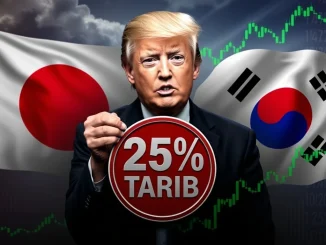
The landscape of finance is rapidly evolving, and nowhere is this more evident than in the realm of digital assets. For investors and enthusiasts following the market, particularly in key global regions, understanding potential policy shifts is crucial. A significant development has emerged regarding **South Korea crypto**, where a leading political figure has outlined ambitious plans for the future of digital assets in the nation.
Understanding the South Korea Crypto Landscape
South Korea has long been a hotbed for cryptocurrency activity. With a tech-savvy population and high rates of digital adoption, the nation boasts one of the most active crypto trading markets globally. However, the regulatory environment has often been a point of discussion, balancing the need for innovation with investor protection and financial stability. This dynamic backdrop sets the stage for the recent proposals.
The Promise of a Spot Crypto ETF
One of the most talked-about pledges comes from Lee Jae-myung, the presidential candidate from the Democratic Party of Korea (DPK). According to reports from local media outlet News1, Lee announced via his Facebook account a commitment to introduce a **spot crypto ETF**. But what exactly is a spot crypto ETF, and why is this pledge significant?
- A spot crypto ETF (Exchange-Traded Fund) holds the actual underlying cryptocurrency (like Bitcoin or Ethereum) rather than futures contracts.
- It allows investors to gain exposure to the price movements of cryptocurrencies without directly buying, storing, or managing the digital assets themselves.
- Introduction of a spot crypto ETF could provide easier access for traditional investors and potentially increase institutional participation, bringing greater liquidity and mainstream acceptance to the market in South Korea.
- This move aligns with calls from many in the crypto community for regulated investment products that track the spot price, similar to gold or stock ETFs.
Addressing Crypto Trading Fees
Beyond the introduction of regulated investment vehicles, Lee Jae-myung also addressed a pain point for many active traders: high transaction costs. His plan includes a commitment to reduce **trading fees** for digital asset exchanges. High fees can eat into profits, especially for frequent traders or those dealing with smaller amounts. Lowering these costs could make trading more accessible and potentially boost market activity. This proposal signals an awareness of the practical challenges faced by everyday crypto participants.
Balancing Innovation and Crypto Regulation
While promoting market access and affordability, the candidate also emphasized the need for a safer trading environment. The pledges include implementing a comprehensive monitoring system. This aspect of the **crypto regulation** plan aims to protect investors from fraudulent activities, market manipulation, and other risks inherent in the digital asset space. Finding the right balance between fostering innovation and implementing robust safeguards is a critical challenge for policymakers worldwide. A well-designed monitoring system could enhance market integrity and build greater trust among potential investors, while an overly restrictive one could stifle growth.
What This Crypto Policy Means
Lee Jae-myung’s **crypto policy** proposals are clearly aimed at appealing to a segment of the population deeply engaged with digital assets. By promising both greater market access (spot ETFs) and reduced costs (lower fees), coupled with enhanced safety measures (monitoring), the candidate is positioning himself as a proponent of a more mature and accessible crypto market in South Korea. While these are pledges made during a political campaign and their eventual implementation would depend on election outcomes and regulatory processes, they highlight the growing political recognition of the importance of the cryptocurrency sector.
These proposals could have several potential impacts:
- Increased investor participation, both retail and institutional.
- Enhanced legitimacy and perception of the crypto market within South Korea.
- Potential for South Korea to become a more attractive hub for crypto businesses and investment.
- The need for careful consideration of how the monitoring system is implemented to avoid stifling innovation or privacy concerns.
The conversation around cryptocurrency regulation and integration into traditional finance continues globally. Pledges like these from prominent political figures in major economies like South Korea underscore the increasing mainstream relevance of digital assets and the potential for policy to significantly shape their future development.
Summary
In summary, South Korean presidential candidate Lee Jae-myung has laid out a forward-looking plan for the nation’s digital asset market. Key components include the introduction of a **spot crypto ETF**, a reduction in **trading fees**, and the implementation of a comprehensive monitoring system to enhance safety. These proposals, part of his broader **crypto policy**, aim to boost accessibility, reduce costs, and strengthen **crypto regulation** in South Korea. While the path to implementation involves navigating political and regulatory hurdles, these pledges signal a potential shift towards greater integration and mainstream acceptance of cryptocurrencies in one of the world’s most active markets. The focus remains on how these ambitious plans might ultimately reshape the **South Korea crypto** landscape for investors and the industry alike.



